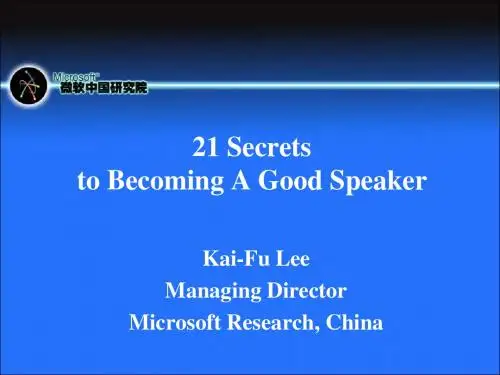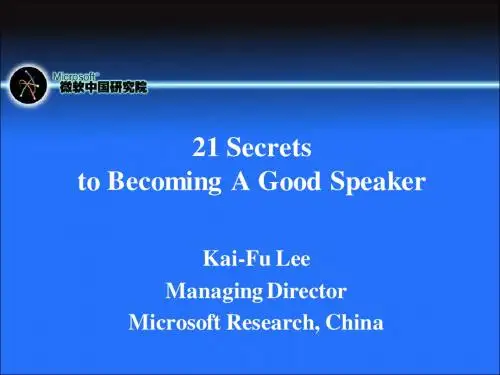21种演讲技巧英文
- 格式:ppt
- 大小:1.33 MB
- 文档页数:8





![[ppt]21种演讲技巧(英文)](https://uimg.taocdn.com/8a1ea81b4431b90d6c85c70b.webp)
Secrets21 Secrets21to Becoming A Good SpeakerKai-Fu LeeManaging DirectorMicrosoft Research, ChinaWe Present Every Day!•Not just conference talks….–Product group meetings–BillG / TAB meetings–Preamble to a demo–Convince a product group to be interested–Present patent to a lawyer–Present a group result at offsite–“Elevator” talksBut Im not good at it…….But I’’m not good at it•Presentation skills can be acquired.•Examples:–Bill Gates–Kai-Fu LeeWhat You’ll Learn Today:•Communication skills•Preparing the Talk•Delivering the Talk•Handling Q&A•21 secrets to becoming a good speaker.What is Communication Skills?•Verbal (words spoken)•Vocal (tone, range, appeal, credibility of voice)•Visual (physical appearance, clothing, gestures, eye contact)•7%•38%•55%CommunicationSkillsThe Importance ofCommunication Skills “Without effective delivery,a speech of the highest mental capacitycan be held in no esteem.With effective delivery,even one with moderate abilities maysurpass those of the highest talent.”-- Cicero“The man who can think and does not knowhow to express what he thinksis at the level of him who cannot think.”-- PericlesCommunication Skills = Fake?•Most important factor is PASSION!–If you’re passionate, your vocal & visual skills willcome naturally.•Passion could come from subject, experience, or environment.–“There is just one sure cure for bad speeches –Get truly excited on the subject, and 99 percentof the faults of your speaking will disappear.”-- Robert Montgomery• But there are skills to be learned.–Like reading, writing, typing….–Must learn this, if you want your work to be understood!Verbal Skills•Be simple and clear!–Don’t ramble.–Stop to think if you need to.–Example one: Dan Quayle celebratesdemocracy:–Example two: Dan Quayle trying to say“A mind is a terrible thing to waste”Verbal Skills•Speaking is not like writing!!!–Use simple words.–Don’t use complex sentences.–Can you understand this:•Don’t use ambiguous words in speech.Vocal Skills•Project & resonate your voice.•No “UM”s and “ER”s. (Pause instead).•Silence is a tool (To draw attention).Vocal Skills •Play your voice with pitch and tempo.•To amplify a point, slow down, speak loudly, exaggerate inotation, pause in the right places.–“You are right. I am wrong”– Stalin to Trotsky–“Ask not what your country can do for you; ask whatyou can do for your country”-- John F. Kennedy–BAD EXAMPLE : “I welcome this kind ofexamination, because people have to know whethertheir president is a crook. Well, I’m not a crook.”-- Richard M. Nixon•DonDon’’t use it everywhere!Vocal Skills : Same message;deivermany ways tomany ways to deiver•John Kennedy:–“You need to contribute to your countryYou need to contribute to your country”’”’–“Ask not what your country can do for you; askwhat you can do for your country””.what you can do for your country•Quayle vs. Benson Debate:–Quayle: "I have as much experience in the Congressas Jack Kennedy did when he sought thepresidency."presidency."–Answer 1:“Jack Kennedy is betterthan you.”–Answer 2: "Senator, I served withJack Kennedy.I knew Jack Kennedy.Jack Kennedy was a friend of mine.Vocal Skills : Enthusiasm •Passion & Enthusiasm!–If you’re not passionate, why should we care?•Example: Martin Luther King–I have a dream.That one dayThis nation will rise upLive up to the true meaning to its creed:We hold these truths to be self-evidentThat all men are created equal.Visual Skills •Visual Skills – THE most important–Appear trustworthy & respectful.–US Election 1960 was won on visual skills.•Components of Visual Skills–Eyes–Body–Hands–FaceVisual Skills – Eyes •Look forward at audience (trust)–Don’t shift eyeballs; don’t look in corner.–Don’t look too much at computer screen oryour notes.•Look at people’s faces (not eyes)–3-6 seconds per person.–Shift randomly.–Nod, smile, use facial expression.Visual Skills – Body•Stand up when talking.•Walk around = informal.•Don’t:–Rock, shake, lean too much.Visual Skills – Hands•Gesture complements talk.–Should come naturally, without thinking.–Make sure they match!•Need to exaggerate a little–Especially with large audience.•Don’t fidget or put in pocket.•Videotape whole talk & watch.Visual Skills – Face•Show emotion!•Most of the time:–“I care a lot about this.”–“I really believe in this.”–“I love my work.”•Sometimes (in response to questions).–“This is the most outrageous thing I’ve ever heard.”–“I will have nothing to do with this.”What You’ll Learn Today:•Communication skills•Preparing the Talk•Delivering the Talk•Handling Q&A•21 secrets to becoming a good speaker.Preparing the Talk•Always OVERPREPARE!!!!!•Preparation includes:–Researching the background.–Organizing the talk.–Writing the slides.–Rehearsing the talk.–Last minute things….Researching the Background•When you’re invited, find out:–How long is the talk?–What’s the topic?•(Say no if you don’t care about the topic).–Who’s the audience.•Once you say yes, you are COMMITTEDto do a great job.Organizing the Talk•You’re the salesman.•First lesson for salesmen:–“Tell them what you’re going to say.–Say it.–Tell them what you said”•Very similar to your paper!The Central Message (it)•People will not remember everything.•Have ONE clear walk-away message.–What do you want people to remember in 3months?–The answer to the question:“How was the talk?”•Repeat it!The Opening•Say something provoking!•Give a (very short) outline/overview.The Substance •Logical.•Convincing.–Help them remember the message!–Anticipate doubts & remove them.•Smooth transitions–Don’t lose the audience–OK to re-order the sub-topics.•Keep repeating the message!The Ending•End with a BANG!•Repeat the message.•Say thank you.Writing the Visuals (PowerPoint)•Prepation (80% time)–First prepare outline (recommend : Word).–Then modify outline for:•Logic onvincing, flow, transitions….•Actual Slide Writing (20% time)–Should come almost directly from the outline.Use of Visuals (PowerPoint)•Visuals only support your talk.–Spend more time on your talk!•Simple and clear–1 idea; 3 sub-concepts; <= 6 lines.–Readable – Big & color-coordinated.•Don’t read from the slides!What if Talk is Complex•Don’t lose people.–Use grayed out outline.•If idea is complex:–Try really hard to avoid complex slides, but…–If you must use it, use layers (prevent read-ahead & lack of focus).•Remember to change slides for printing.•Example….If you must use complex layers…a good exampleContent Server Proxy Server Clients 3. return content 1. open connection & send request Content re-authoringClient/Userprofiles Adaptationschemes Networkmonitoring Caching &pre-fetching management 2. retrieve content2. retrieve content3. retrieve network data, user/client profiles4. perform adaptation5. return content 1. open connection & send requestUse of Demos / Multimedia•Keeps the talk interesting.•Don’t overdo it.–Should be tied to content.•Ordering :–2,N, N-1, N-2,….3, 1Rehearsing Your Talk•Record & listen to every talk at least twice!•Record:–Best : PowerPoint features.–OK : Tape recorder.–Must do sometime :•Video•Ask experienced speaker to critique.•Improve:–Style, logic, timing per slide.Get the Timing Right!•Running out of time is a disaster.•Write how much time should remain oneach slide.After you’re more experienced….•No longer necessary to record.•Every new talk still must be rehearsed.•Bring notes if you aren’t confident.Just Before the Talk….•Prepare something matching the occasion.•Make sure you’re not too tired:–Get enough sleep the previous night.–Drink 3 cups of coffee!What You’ll Learn Today:•Communication skills•Preparing the Talk•Delivering the Talk•Handling Q&A•21 secrets to becoming a good speaker.Delivering the Talk•Overcoming language barrier.•Overcoming nervousness.•Art of Good Opening & ending.•Humor•Audience participationOvercoming Language Barrier•Perfect English not necessary.•Know your limitations.–Don’t use fancy words, complex sentences.–Don’t take any chance of looking silly.•OK to bring cheat notes!Outline & Script•Always make an outline.–PowerPoint notes; Word Outline.–Don’t have to use it.•It may be best to READ a speech.–No excuse not to be fluent! (practice!)–Don’t stare at paper.–(Memorize it if you’re prefer).Overcoming Nervousness “Do the thing you fearand the death of fear is certain.”-- Ralph Waldo EmersonHiding Nervousness•It is possible to hide nervousness!•Don’t let the shaking show!–Make a fist; hold the lectern.–Speak loudly.–Take a deep breath.•Look at a friendly face.•Look above people’s heads.Art of Good Opening & Ending•Opening–Say something relevant to the occasion.–Need to research background before the talk.•Ending–“If you remember only one thing from this talk,then you should remember XXX”.Humor•Good humor:–Respectful.–Relevant (better yet: original).–Short.•Plan your jokes:–Remember what worked.–Use it again!Humor•How to tell a joke?–Set up (people should know a joke is comingup).–Pause after climax (punch line).•Move on naturally if no reaction!Audience Participation•Best way for people to remember!•Ask audience a question–Anticipate their answer(s)!–Respond with something interesting ANDrelevant.Be Yourself•Learn the skills; don’t copy the styles.•You must be yourself to be credible.•Many styles could be effective:–Bill Gates – Brilliant technologist–Steve Ballmer – Powerful salesman–Steve Jobs – Passionate evangelistWhat You’ll Learn Today:•Communication skills•Preparing the Talk•Delivering the Talk•Handling Q&A•21 secrets to becoming a good speaker.Q&A•Q&A is your chance to:–Amplify your points.–Increase your credibility.Dealing with Questions•Easy Questions–Amplify your points!•Hard Questions–No need to answer directly.–But don’t hide!•Narrow Questions–Take offline.Q&A – Giving A Good Answer•Respect the listener•Right body language•Repeat the question–Complete if people cannot hear.–Paraphrase to help amplify your point.•If people are too shy, you start!•Don’t argue or dismiss a question.。




